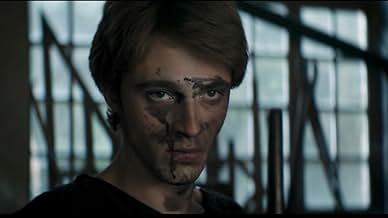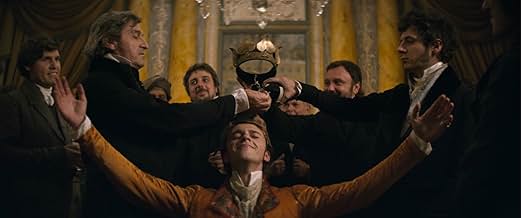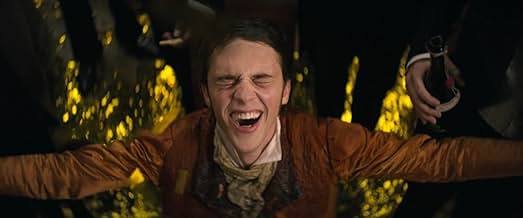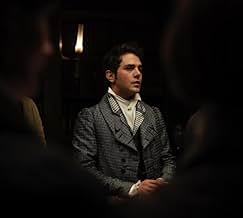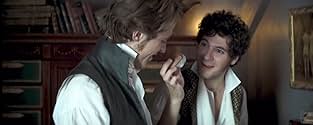ÉVALUATION IMDb
7,4/10
7,2 k
MA NOTE
Une adaptation du roman d'Honoré de Balzac "Illusions perdues".Une adaptation du roman d'Honoré de Balzac "Illusions perdues".Une adaptation du roman d'Honoré de Balzac "Illusions perdues".
- Prix
- 8 victoires et 19 nominations au total
Avis en vedette
I won't repeat the storyline here as that's already been covered by many others. Lost Illusions is a visually sumptuous film throughout. I did notice that all of the camera work is quite tight, with very few if any longshots. As such it can feel slightly claustrophobic, if by design or chance I'm not sure. I'm not suggesting it a positive or negative, just an observation. I generally liked the male performances, especially Voisin does a nice job. Salome Dewaels does a very fine job as well but I feel the two other female performances were both a bit constrained. Several viewers took issue with the volume of narration - to that I feel there might have been a couple of instances of this, ever so slightly, but for the most part I have no major issues with this element. Lost Illusions is a beautiful and interesting film worth checking out.
After a long hiatus since the pandemic, I made a return to the cinema notably to catch up with #lefrenchfilmfestival. Most of the films I would say struggled to justify your time in the cinema indulging in such frivolity but this one particularly stood out.
I am not familiar with and have never read Balzac but I reckon this film gives you a glimpse of his genius and why he remains a giant in French literary circle, not merely for prose or poetry but for his devastatingly incisive social commentary still relevant today.
And one couldn't help but feel despite our technological advancements and having totally plundered the planet, from a moral standpoint the world hasn't progressed not even an inch today and remains mercilessly mercenary under a veneer of righteousness as Balzac had so accurately depicted some two centuries ago.
Dazzlingly executed with a superb ensemble of cast, illuminating performances, a production nothing short of breathtaking and lashings of Baroque including the less often heard Jean-Philippe Rameau, the film remains and stays with you long after you have left the cinema.
I am not familiar with and have never read Balzac but I reckon this film gives you a glimpse of his genius and why he remains a giant in French literary circle, not merely for prose or poetry but for his devastatingly incisive social commentary still relevant today.
And one couldn't help but feel despite our technological advancements and having totally plundered the planet, from a moral standpoint the world hasn't progressed not even an inch today and remains mercilessly mercenary under a veneer of righteousness as Balzac had so accurately depicted some two centuries ago.
Dazzlingly executed with a superb ensemble of cast, illuminating performances, a production nothing short of breathtaking and lashings of Baroque including the less often heard Jean-Philippe Rameau, the film remains and stays with you long after you have left the cinema.
I started to read "Lost Illusions" once and didn't get very far. Not that I thought it was bad, but rather that I just wasn't in the mood for Balzac's style of writing just then. I'll probably revisit it some day.
So I can't speak to how good an adaptation this movie is, but man is it a good movie in its own right. I love stories about women in big dresses and men in cravats exchanging significant glances in drawing rooms, which is pretty much all this movie is. The young actor Benjamin Voisin carries this movie admirably on his slim shoulders, and the whole thing is a scathing indictment of the relationship between journalism, wealth, and power. It's eye opening, not necessarily because it's surprising, but because it makes Paris of the 1800s relevant to the world of 2023.
And I don't think I've ever seen a more effective and artistic closeup of male genitalia in a film before. The juxtaposition of a fistful of money against a male penis says in a single image what Balzac spent pages and pages communicating to his readers.
Grade: A.
So I can't speak to how good an adaptation this movie is, but man is it a good movie in its own right. I love stories about women in big dresses and men in cravats exchanging significant glances in drawing rooms, which is pretty much all this movie is. The young actor Benjamin Voisin carries this movie admirably on his slim shoulders, and the whole thing is a scathing indictment of the relationship between journalism, wealth, and power. It's eye opening, not necessarily because it's surprising, but because it makes Paris of the 1800s relevant to the world of 2023.
And I don't think I've ever seen a more effective and artistic closeup of male genitalia in a film before. The juxtaposition of a fistful of money against a male penis says in a single image what Balzac spent pages and pages communicating to his readers.
Grade: A.
I'm not against the use of a narrator in a movie by principle. Narration can be useful to set context, or, even better, have an interesting dialogue with the action. However, I struggle to understand what the writers of this movie were thinking when they decided that every beat of this story needed narration. I felt like I was reading a picture book. It really diminished my enjoyment of the movie. Too bad, because it's a good story, served by excellent actors (I particularly loved Salomé Dewaels) and beautiful costumes and sets. A lot of the narration could have been cut by being more creative with the script and telling us things in different ways, or by simply leaving a few things unsaid and trusting the audience to cope with some ambiguity.
I'm frankly baffled by the fact that it won the "best movie" and "best adapted scenario" César awards (admittedly, I haven't seen its competition).
Also, the little nods to our present time, mostly done by that same narration, were very unsubtle. In a better film, I might have funnier, but there they tended to annoy me.
I'm frankly baffled by the fact that it won the "best movie" and "best adapted scenario" César awards (admittedly, I haven't seen its competition).
Also, the little nods to our present time, mostly done by that same narration, were very unsubtle. In a better film, I might have funnier, but there they tended to annoy me.
I was a little scared before watching this film; I was scared to get bored, because romance in costume is not my stuff. Speaking of costume movies, this is not BARRY LYNDON but a captivating French film, which could have been made seventy years ago by an Albert Lewin, starring George Sanders, except maybe that the lead character here is not as nasty, selfish, cynical as Sanders was in his films, and mabe not only in his films... This is the itinerary of an idealistic young man, not naive but ambitious, who tries to survive in the Paris jungle: journalism, theater, publishing, politics, a cruel, superficial, cynical, rotten, insecere, opportunist world where sharks spread everywhere. I guess Claude Chabrol could have made it too, and I think Xavier Gianolli is an authentic heir ofChabrol. It is brilliant, sensitive, bittersweet and full of details of the atmosphere of this period. Adapted from Honoré de Balzac, this would be great if this kind of films could be made about more novels from Balzac or even Zola, why not? This is millions of times better than stupid French comedies for red necks where you need someone near you to tell you when to laugh. It is after all a rise and fall scheme, which makes it more interesting.
Le saviez-vous
- AnecdotesThe character of Nathan d'Anastazio, played by Xavier Dolan, is actually a synthesis of three characters from the novel: Raoul Nathan, a scheming journalist, Daniel d'Arthez, a hard-working writer and Melchior de Canalis, a successful poet.
- GaffesThe Dejazet theater is mentioned, but the movie takes place in the early 1800s, during the Restoration, and this theater was inaugurated on September 27th, 1859.
- Bandes originalesConcerto in A Minor, BWV 1065: I. Allegro
Composed by Johann Sebastian Bach
Performed by Ensemble Bruno Rigutto, Gabriel Tacchino, Jean-Philippe Collard, Jean-Pierre Wallez, Michel Beroff & Paris Orchestral
Meilleurs choix
Connectez-vous pour évaluer et surveiller les recommandations personnalisées
- How long is Lost Illusions?Propulsé par Alexa
Détails
- Date de sortie
- Pays d’origine
- Site officiel
- Langue
- Aussi connu sous le nom de
- Lost Illusions
- Lieux de tournage
- sociétés de production
- Consultez plus de crédits d'entreprise sur IMDbPro
Box-office
- Budget
- 18 700 000 € (estimation)
- Brut – États-Unis et Canada
- 126 391 $ US
- Fin de semaine d'ouverture – États-Unis et Canada
- 15 182 $ US
- 12 juin 2022
- Brut – à l'échelle mondiale
- 8 635 184 $ US
- Durée
- 2h 29m(149 min)
- Couleur
- Rapport de forme
- 2.41 : 1
Contribuer à cette page
Suggérer une modification ou ajouter du contenu manquant




